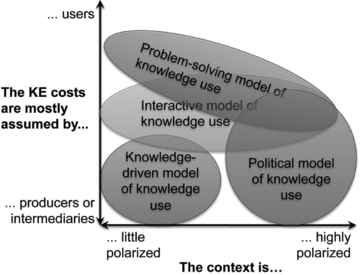Knowledge exchange processes in organizations and policy arenas: a narrative systematic review of the literature
- PMID: 21166865
- PMCID: PMC3037172
- DOI: 10.1111/j.1468-0009.2010.00608.x
Knowledge exchange processes in organizations and policy arenas: a narrative systematic review of the literature
Abstract
Context: This article presents the main results from a large-scale analytical systematic review on knowledge exchange interventions at the organizational and policymaking levels. The review integrated two broad traditions, one roughly focused on the use of social science research results and the other focused on policymaking and lobbying processes.
Methods: Data collection was done using systematic snowball sampling. First, we used prospective snowballing to identify all documents citing any of a set of thirty-three seminal papers. This process identified 4,102 documents, 102 of which were retained for in-depth analysis. The bibliographies of these 102 documents were merged and used to identify retrospectively all articles cited five times or more and all books cited seven times or more. All together, 205 documents were analyzed. To develop an integrated model, the data were synthesized using an analytical approach.
Findings: This article developed integrated conceptualizations of the forms of collective knowledge exchange systems, the nature of the knowledge exchanged, and the definition of collective-level use. This literature synthesis is organized around three dimensions of context: level of polarization (politics), cost-sharing equilibrium (economics), and institutionalized structures of communication (social structuring).
Conclusions: The model developed here suggests that research is unlikely to provide context-independent evidence for the intrinsic efficacy of knowledge exchange strategies. To design a knowledge exchange intervention to maximize knowledge use, a detailed analysis of the context could use the kind of framework developed here.
© 2010 Milbank Memorial Fund. Published by Wiley Periodicals Inc.
Figures
Comment in
-
History matters for understanding knowledge exchange.Milbank Q. 2010 Dec;88(4):484-91. doi: 10.1111/j.1468-0009.2010.00609.x. Milbank Q. 2010. PMID: 21166866 Free PMC article. No abstract available.
-
What is this knowledge that we seek to "exchange"?Milbank Q. 2010 Dec;88(4):492-9. doi: 10.1111/j.1468-0009.2010.00610.x. Milbank Q. 2010. PMID: 21166867 Free PMC article. No abstract available.
References
-
- Ainsworth S. Regulating Lobbyists and Interest Group Influence. Journal of Politics. 1993;55:41–56.
-
- Albaek E. Between Knowledge and Power: Utilization of Social Science in Public Policy Making. Policy Sciences. 1995;28:79–100.
-
- Alkin MC, Taut SM. Unbundling Evaluation Use. Studies in Educational Evaluation. 2003;29:1–12.
-
- Amara N, Ouimet M, Landry R. New Evidence on Instrumental, Conceptual, and Symbolic Utilization of University Research in Government Agencies. Science Communication. 2004;26:75–106.
-
- Arendt H. Vérité et politique. In: Arendt H, editor. La crise de la culture. Paris: Folio; 1972. pp. 289–336.
Publication types
MeSH terms
Grants and funding
LinkOut - more resources
Full Text Sources



